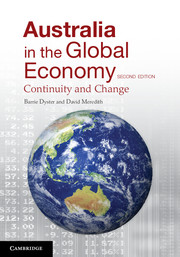Book contents
- Frontmatter
- Contents
- List of Tables
- List of Figures
- Preface
- 1 Introduction, themes and overview
- Part I Before 1914
- 2 International impacts on Australia before 1914
- 3 Australia before 1914
- Part II 1914 to 1940
- Part III 1941 to 1973
- Part IV 1974 to the 1990s
- Part V Since the 1990s
- Statistical appendix
- Glossary of economic terms
- Bibliography
- Index
- References
2 - International impacts on Australia before 1914
from Part I - Before 1914
Published online by Cambridge University Press: 05 November 2012
- Frontmatter
- Contents
- List of Tables
- List of Figures
- Preface
- 1 Introduction, themes and overview
- Part I Before 1914
- 2 International impacts on Australia before 1914
- 3 Australia before 1914
- Part II 1914 to 1940
- Part III 1941 to 1973
- Part IV 1974 to the 1990s
- Part V Since the 1990s
- Statistical appendix
- Glossary of economic terms
- Bibliography
- Index
- References
Summary
In the 1990s, there was much comment in Australia and elsewhere about ‘globalisation’ and the emergence of a ‘global economy’ (see Martin 1997; Wiseman 1998). Such an economy was characterised by expanding world trade, liberalisation of international flows of money, goods and services, dramatic changes in international transport and communications, massive international flows of capital and an increasingly worldwide scale of international business. ‘Globalisation’ seemed to imply that all national economies were being integrated and linked together so that virtually no part of the planet was economically isolated any longer. The emphasis on ‘globalisation’ at the end of the twentieth century was not surprising, as the Cold War ended and the information technology revolution gathered pace. However, this description could just as accurately have been applied to the growth and development of the international economy in the 40 years prior to the outbreak of the First World War in 1914, a period that should perhaps now be dubbed the ‘first global economy’. This chapter explores the causes of the emergence and development of the first global economy and its impact on Australia.
Industrialisation: transforming agrarian economies
At the heart of the expansion of the international economy in the nineteenth century was the Industrial Revolution that had started in Britain and by the end of the century had spread to Western Europe, North America and Japan. Industrialisation was a process that fundamentally transformed agrarian economies and created the world’s first industrial societies. Over the last 200 years, it has spread to many parts of the world and has developed mature and even ‘post-industrial’ forms in the older industrialised economies. The impact on all aspects of society was profound, perhaps most obviously in the material wealth industrialisation engendered, though the distribution of the material benefits of the Industrial Revolution was far from equal within the industrial societies. In a global context, industrialisation enormously enhanced the wealth, power and status of those nations whose economies were being transformed, allowing a small number of industrial nations to dominate the world economically and politically in a way that had not been experienced before. (For a survey of the literature on industrialisation in the nineteenth century, see Hudson 1992; Allen 2009; Griffin 2010.)
- Type
- Chapter
- Information
- Australia in the Global EconomyContinuity and Change, pp. 29 - 52Publisher: Cambridge University PressPrint publication year: 2012



